Cinebench
Cinebench is an application which renders a photorealistic 3D scene to benchmark a computer’s rendering performance, on one CPU core, all CPU cores or using the GPU. We run the test using the all-core CPU and single-thread CPU modes.
Handbrake Conversion
Handbrake is a free and open-source video transcoding tool that can be used to convert video files between different codecs, formats and resolutions. We measured the average frame rate achieved for a task of converting a 6.27GB 4K video using the Normal Profile setting and MP4 container. The test stresses all CPU cores to 100% and shows an affinity for memory bandwidth.
x265 Encoding
x265 Encoding tests system performance by encoding a 1080p test file using the x265/HEVC format.
Overview:
Both Threadripper chips make blazing starts in the Cinebench multi-threaded tests. Hitting around 3000 Cinebench points out of the box, the 1950X opens up a new level of rendering performance, based on the Cinebench numbers. Stock vs stock, AMD's equally-priced 1950X is 37% faster than the i9-7900X. With both overclocked, the AMD chip's lead is 39%. Even the $200 cheaper 1920X hands the $999 i9-7900X a beating by being 13% faster at stock and 7.6% faster with both overclocked.
Keeping the focus on Cinebench multithreaded, the performance scaling from AMD's increase core count is near perfect. The 12C24T 3.7GHz all-core 1920X is 99.5% faster than the 6C12T 3.7GHz all-core Ryzen 5 1600X. A 99.5% performance uptick for a 100% increase in cores is pretty good indeed! Performance scaling from the Ryzen 7 1800X to the Ryzen Threadripper 1950X was not as close to 100% due to the 16-core chip reducing its all-core Precision Boost clock speed to around 3.475GHz under heavy load (likely due to TDP limitations).
Looking at Cinebench single-threaded performance, Intel's higher-clocked parts with superior Skylake- or Kaby Lake-based microarchitecture are still the champs. Nothing from AMD can touch the single-threaded performance of Skylake-based chips. 4.2GHz XFR seems to be a little hit-or-miss with our Cinebench tests, as shown by the 1920X outperforming the 1950X (which shouldn't be the case due to 4.2GHz XFR on both). Run-to-run variance with Cinebench also plays a role.
Moving on to Handbrake, the 1950X forces its way to another performance victory. In fact, the 12-core and 16-core chips have so much processing power and so many threads, our high-bitrate 4K conversion tasks was struggling to saturate all resources. Despite operating at around 80% overall usage, the 1950X still managed to outperform Intel's i9-7900X by 20% stock vs stock and 14% OC vs OC. That's with enough CPU horsepower spare on the 1950X to theoretically just about run Ghost Recon Wildlands at 4K at the same time, for example.
The 1920X sat closer to 100% CPU usage in Handbrake most of the time and in doing so, proved competitive against the more expensive i9-7900X.
Our x265 benchmark was another test that simply could not feed the sheer number of threads made available by the Ryzen Threadripper CPUs (and Intel 10-core chips by extension but to less of a degree). As such, the test showed increased preference for clock speed over thread count past a certain number. Intel's Skylake-X i9-7900X was outperformed by the 1950X by 16% and by the 1920X by 4.3% for stock vs stock. However, a 4.6GHz clock speed netted the Intel flagship a performance lead of 5.4% against the 1950X and 17% compared to the 1920X with all CPUs overclocked.
Its 4.6GHz clock speed allow Intel's Core i9-7900X to load all threads to around 90-100% when encoding. However, the 1950X's 3.95GHz frequency meant that average CPU usage was around 60-75%. In this test, that makes Intel's chip good for users who want all-out performance and AMD's similarly-priced competitor a smart option for heavy multi-taskers.
 KitGuru KitGuru.net – Tech News | Hardware News | Hardware Reviews | IOS | Mobile | Gaming | Graphics Cards
KitGuru KitGuru.net – Tech News | Hardware News | Hardware Reviews | IOS | Mobile | Gaming | Graphics Cards


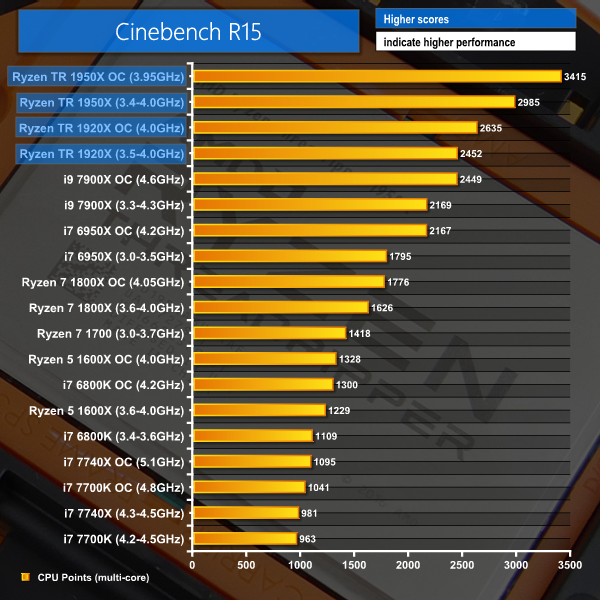
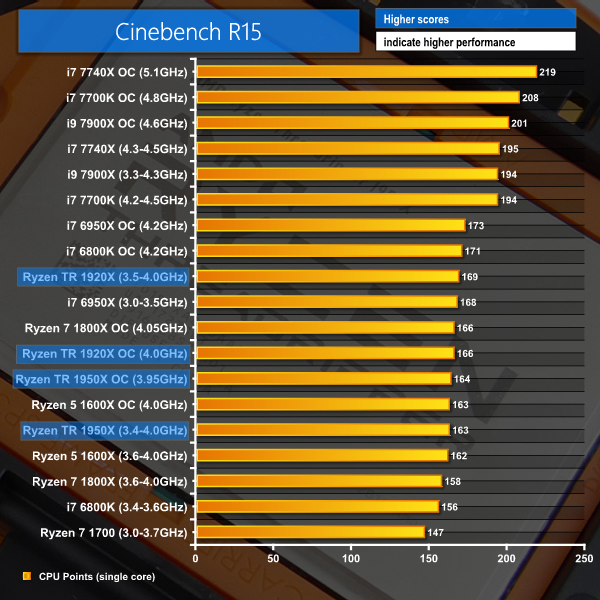

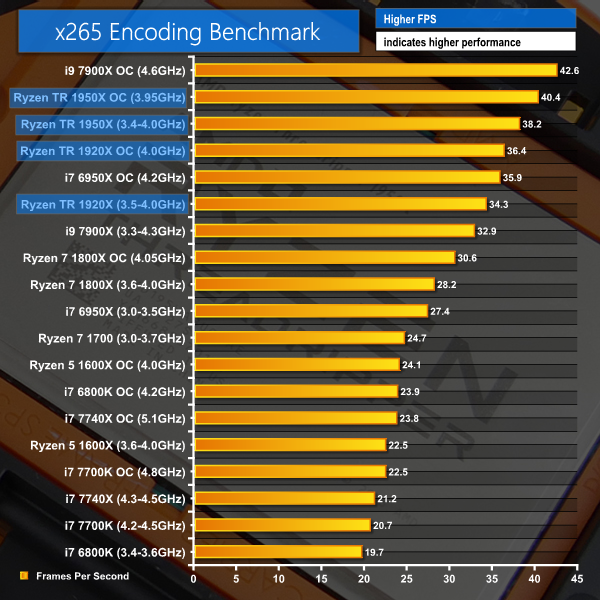
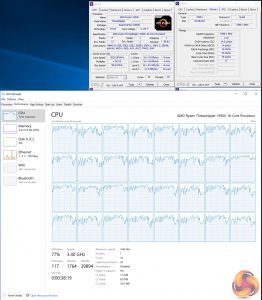
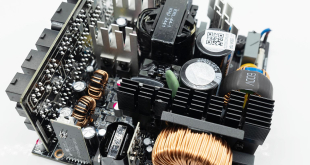
So it’s a beast for productivity [if it’s capable of delivering reliability in the long run], and it’s just fine for gaming, but not as cool as Intel. Not bad, not that great either. No reason to go away from X299 for now. I wonder how will the 12 – 18core Intel fare, both with performance and prices. Great review, proving my point in many discussions, thank You 🙂
so single core comparation is done with intel set at 4.5-5GHz and AMDs at 4.0GHz, and you’re surprised of that Intel’s is better 😐
So to test the maximum overclocked speeds of each you want Luke to achieve a 4.5ghz overclock on the Ryzen even though its just not possible. Perhaps Gandalf can help him with some magical powers.
Yes. All testing is done at stock and the realistic achievable overclocks on each CPU. Throttling Intel back to X GHz would be unfair if the Intel chips can OC further. Just as it would be unfair to throttle back Ryzen CPUs if they have faster clock speeds than their competitors.
Stock and realistic OC frequency is what we always test on all CPUs. Intel’s Skylake-X and Kaby Lake CPUs tend to OC higher than AMD’s Ryzen chips so that’s what people run their frequencies at and that’s what we test with.
Luke
Ok, i get that but …
1. Same cooling was used for both?
2. Is TR restricted, or why can’t it go pass the boosted clocks?
So, considering that AMD again gives 50 and 60 percent more cores for a same or the similar price those CPUs are a beasts for people who need productivity and content creation CPU
Who games at 1080p with a £1000 CPU and a GTX1080 ti? Wasn’t Ryzen equal to its intel equivalent at higher resolutions, Is this the same with ThreadRipper?
“Cons” in the review are so depraved you can not even imagine, and lacking 1 star out of 10…. For what? For not being available for free?
Oxymorons
I have to slightly disagree with the gaming analysis. Many times the reason RYZEN doesn’t perform well in gaming is that game developers still haven’t had enough time to optimize the RYZEN platform. Game developers haven’t had enough time with the AMD RYZEN hardware development kits as of yet.
The same cooling was used for all CPUs (280mm AIO) except Threadripper which used a 360mm Asetek AIO due to mounting compatibility.
The frequency limits for Ryzen look to be related to the manufacturing process technology used by AMD. At its own fabs, Intel looks to have the ability to manufacture dies that can operate at a higher frequency in general.
1080P and a fast GPU helps isolate CPU performance by ensuring no resolution- or GPU-induced bottlenecks are introduced. Our 4K testing shows Ryzen to be far more competitive against Intel when the performance onus is planted more firmly on the GPU.
Ok, thank you. Maybe Threadripper will be able to get higher OCs with some bios updates, how it happened to Ryzen 🙂
Are you confident its not a fabric/zeppelin die limitation rather than the zen core or the ccx?
If that hasnt been eliminated, perhaps raven ridge can shed some light eventually? As i understand it, and given it must be low power for mobile, it will be a single 4 core zen ccx & a single vega gpu on a die like ryzens zeppelin die. Point being, maybe it can clock better in that die form.
Agreed. Irrespective of the amount cooling available, no multi cores CPU would survive a Prime95 stress test on all cores for 30 minutes, let alone 1 hour or more. Prime95 should be taken off the web.
Current rumors predict $1,700 for the 16-core, and $2,000 for the 18-core.
Hey Luke. May I ask how you obtained the all-core turbo frequencies of the 1920X and 1950X? And how confident are you that they are correct? I ask, only because other sources have consistently stated 3.60 GHz for the 1950X. Thank you very much for this in-depth review.
Those are not rumors, they are official Intel pricing, confirmed by multiple outlets and reviewers.
18 core Intel i9 will be $1999.99 (USD)
16 Core Intel i9 will be $1799.99 (USD)
Price v Performance is going AMD’s route, they will end up taking a good portion of the HEDT market with their aggressive pricing and their performance.
“But muh i9 is faster”..
It also has less PCI-E lanes, uses more energy, when overlocked Intel’s 10 core gets hotter than the 16 core AMD, and dollar per dollar is less of a value. This again has been confirmed in testing via many respected hardware outlets/reviewers.
I only have 12 years as an IT professional in hardware management systems, what would I know.
They got the 16 core 1950X to 5.2Ghz on LN2 (Liquid Nitrogen), while that was obviously not representative of real world operations, it did show what can be done.
The issue Intel faces is the technology change that is currently happening where we are switching software from single core/thread ops to multicore and having code recognize the maximum amount of cores possible.
How is this a problem for Intel?
Despite having an immense about of capital to work with an state-of-the-art R&D facilities, Intel’s latest chips have issues with overclocking all cores and remaining efficient. In fact if you look at Intel’s turbo boosts they downclock heavily after 4 cores to keep TDP and energy consumption manageable and competitive. Intel’s biggest weakness is their ability to maximize silicon yields, this is one of the reasons they charge so much for their CPU’s, while AMD’s current approach allows them to scale as they need to with less transistors required on a single die, maximizing yield.
At this current rate I fully expect AMD to release their Zen 2 7nm CPU before Intel gets Cannon Lake (10nm) CPU’s out as AMD is already reporting over 80% yields with 14nm silicon, and anything above 60% yield allows for very competitive prices.
Okay, thanks John. And for the record, yes, I am fully supportive of Threadripper. Intel has been screwing people over for too long.
I’m not sure why you decided to say this, however.
Intel chips are NOT cool. Not even the 91w i5’s. Unless if you think 80c on watercooling for a STOCK i5 Skylake is cool.
Threadripper better as $1k for 16 cores 32 threads when intel like $2k for that. Ya had enough of limitations and greed
Why was enermax aio not used?
I agree. The 16-core 1950X was available on Amazon for $800 not too long ago.
Not as “cool”?, in what sense exactly? as in an over priced haircut kinda cool?
ur obviously a fanboy dick swinger, the only diff. this time u aint playing with the biggest dick.
All reviews out there on the net show Threadripper is faster in basically all productivity apps other than some outdated software that runs better on quads, TR uses less power, has better SMT, has more IO, costs less and has excellent motherboard support.
Wake up from ur delusional dream Bub, just ’cause ur sore that u overpaid for an overvolted stove top cpu that don’t do shit, don’t mean u have to spread ur bull shit propaganda.
Love the 1950x. Runs well at 4.1GHz, and running Prime95 simultaneously w/CPU-Z stress (all cores at 100%), T 105 fps. Other benchmarks show very good performance and durability.